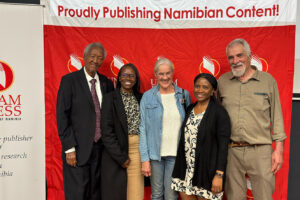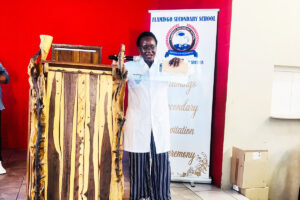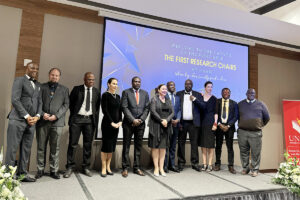The University of Namibia’s Pro-vice Chancellor of Research, Innovation and Development, Professor Anicia Peters, has clinched a Google AI Award for Inclusion Research. The Award was accompanied with an unrestricted gift to UNAM of USD35,000.
The Award for Inclusive Research Programme is a global initiative that supports academic research in computing and technology which addresses the needs of underrepresented populations. This programme allows faculty and Google researchers an opportunity to partner on their initiatives and build new and constructive long-time relationships.
“I am extremely delighted that Google committed to support innovative research and professors working to create positive societal impact. This research focuses on the needs of the African innovators and startups using a design making approach. I am confident that this award will allow Namibia to get one step closer to the rest of the world in terms of technology”, remarked an elated Prof. Peters
Over 100 applications were submitted from different Universities globally but only 16 proposals were selected for funding, in which Prof Peters was selected. Her research was titled “Human Centered Technology Design for Social Justice in Africa” with a Co-Principle Investigator, Dr Shaimaa Lazem, from Egypt. Recipients hailed predominantly from American universities.
The research proposals focused on topics such as diversity and inclusive, algorithmic bias, education innovation, health tools, accessibility, gender bias, Al for social good, security and social justice.
Criteria for the Award included a credible track record of the Researcher’s performance in the selected topic, innovativeness, potential to change the academic landscape and the impact on the communities.
Professor Peters is an astute researcher known internationally for her work in Human Computer Interaction (HCI), an interdisciplinary field in Computing. Human Computer Interaction is one of the underlying key fields for the emerging technologies such as Artificial Intelligence, Big Data, Robotics, The Internet-of-Things, Virtual and Augmented Reality, etc. that are propelling the Fourth and Fifth Industrial Revolutions.
Professor Peters’ research areas span Social Computing, Gamification, Gender and Digital Technologies, and Digital Transformation such as Digital Health and Digital Government. She has penned about 70 publications and has successfully graduated PhD and Master Degree graduates.





